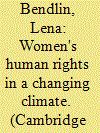| Srl | Item |
| 1 |
ID:
116001


|
|
|
|
|
| Publication |
2012.
|
| Summary/Abstract |
This essay provides insights into studies on citizens' engagement with human rights in Russia through its focus on a relatively under-researched area, namely, the ways in which women perceive the role of human rights in daily life contexts. This essay argues for the importance of analysing how women's perceptions of human rights are formed in situ in order to understand the ways in which location and gender create particular constraints for women in terms of their perceived and actual access to rights protection and ability to use rights to resolve their problems. Drawing on data generated during in-depth interviews conducted with women living in the provincial Russian city of Ul'yanovsk in 2005, this essay reveals women's complex engagements with the meaning and role of human rights in their daily lives. In particular, this analysis shows how women's perceptions of their positionalities in a post-Soviet provincial city informs how they think about where, when and why human rights apply to women.
|
|
|
|
|
|
|
|
|
|
|
|
|
|
|
|
| 2 |
ID:
137150


|
|
|
|
|
| Summary/Abstract |
A women's rights perspective can inform and structure research on climate policy impacts on women. To date, climate policy analysis has mostly considered women as agents of climate protection, that is, objects of mitigation policies, rather than subjects in their own right. However, climate change mitigation involves direct and indirect distributive effects depending on which sectors are involved, which instruments are chosen and how funds are obtained and allocated. Since gender roles impact on individual livelihoods and activities, distributive effects are likely to be gendered. This paper suggests that women's human rights can be used as a framework for research aiming to fill this gap. They provide a well-developed, tested range of criteria for gender justice. Such assessments would allow for a more systematic and comprehensive understanding of the gendered distributive effects of climate policies, notably with regard to the particularly understudied situation in the industrialized world.
|
|
|
|
|
|
|
|
|
|
|
|
|
|
|
|